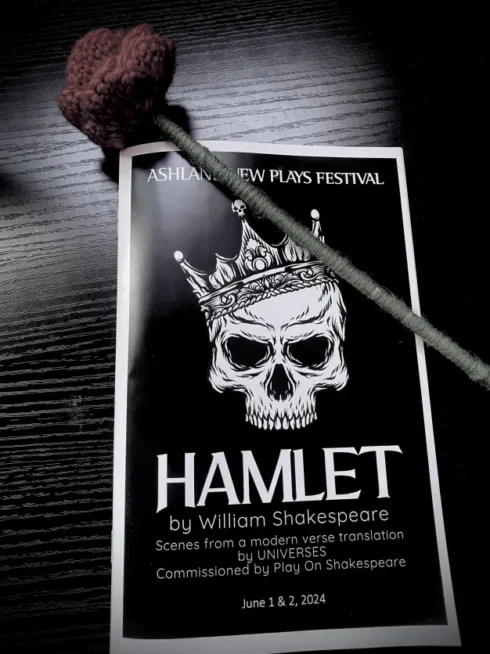In the last weekend of April, the Ashland New Plays Festival hosted its first-ever Playwright’s Retreat, and this author was lucky enough to be in the inaugural class.
Founded in 1992, the Ashland New Plays Festival (ANPF) is a southern Oregon institution focused on fostering new works and supporting playwrights through the workshopping process. ANPF is different from most playfests in how it chooses its material. More than fifty volunteer readers comb through hundreds of submissions, and at their annual fall festival four plays come to life in staged readings. In addition to their fall festival, they also have readings throughout the year and have branched out even more with the writer’s retreat.
This author became a playwright by accident. Fresh out of high school and in my first year of community college, they signed up for a playwriting class thinking it counted as an English credit. Spoiler alert- It didn’t, but they fell in love with the medium. Since then, this author has written a one-act and a handful of ten-minute plays. Not to toot their own horn, but their piece “Don’t Worry About The Closet” won the Gary Garrison Honoree distinction at the Kennedy Center American College Theatre Festival earlier this year, (which you can watch here). “I came to this festival hoping to gain further insight into how I can grow as a writer, particularly when it comes to actually finishing projects,” says Meredith Cook.
Not only did they learn what it takes to get writing projects off the ground, they gained some groundbreaking writing advice from the three playwrights they worked with over the weekend. So, here are three nuggets of wisdom to take away from the experience.
“Write a Shitty First Draft”- E.M. Lewis
Pardon my French, but this is a direct quote. E.M Lewis was the playwright we worked with the most over the weekend, helming roundtable discussions about what meaningful art is and directing us through engaging writing exercises. Her most well-known works are The Gun Show, Heads, and Song of Extinction, the latter of which was presented by ANPF in 2008. Her advice here was simple, but sometimes hard for writers to internalize. Projects take time, and the words you have on the page when you start aren’t going to be perfect right out of the gate. In fact, you should expect them to be shitty! Accept that your work is going to shift and change as you come back to it. That’s why they call it a rough draft- it’s up to you to keep coming back to it and polish out the rough parts.
Write about what pisses you off- Lisa Lomer
We met Lisa in the back room of Noble Coffee Roasters after tasting a sample of 12 of their artisanal coffee blends. Lisa is a force of nature in the writing world, most known for penning The Waiting Room, Roe, and Girl, Interrupted. One of her newest works, Side Effects May Include, takes aim at how pharmaceutical companies don’t actually help people with chronic conditions, and she writes from a place of anger and frustration. Her advice is to do the same! unless you’re getting paid to write a project, you should focus your writing on what you’re passionate about. Write your truth how you see it, and transcribe your feelings on the page. Find what makes your blood boil and then it’s off to the races.
Never look back- Octavio Solis
To conclude the weekend, we met up with playwright Octavio Solis for tea at the Lovejoy Tea Room. This was easily my favorite event of the trip, the food was delicious and Octavo had a lot of great stories to share. He is most well known for his plays Quixote Nuevo and Lydia, but he was also a voice actor and cultural consultant for the Pixar movie Coco. While you might think his advice is some metaphor about having no regrets and always going forward, his words are fairly literal- cover up your words as you write them, either by sliding a piece of paper over your notes or blocking out your computer screen. This is so that you can’t go back and re-read until you’ve finished the draft. For some writers (including myself) the moment I start looking back at what’s on the page, I go from writing mode to editing mode and scrutinize every word until I’m not happy with anything and throw it all in the garbage. So how do you block yourself from being your own worst critic? To block yourself, literally. This ties back a lot into Lewis’s earlier advice-chase that writing flow for as long as you can before taking a break and coming back to your shitty first draft.
Overall, this writer knows they’ve grown as a writer because of this trip. They have begun working on a new project to exercise the knowledge they’ve gathered.
Up next for ANPF is their fall festival, where a handful of the best plays submitted will be performed at SOU’s mainstage theater, and more information can be found on their website.



